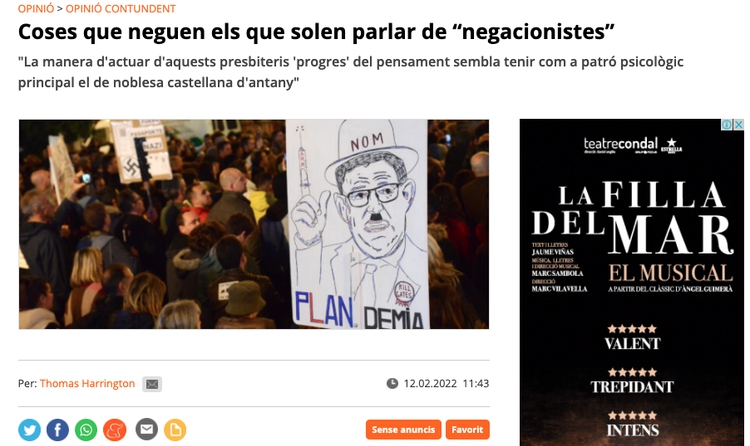Covid-19 vaccines are not catalysts of viral replication

The Catalan news site Vilaweb recently published an article by Thomas Harrington, Professor Emeritus of …

The Catalan news site Vilaweb recently published an article by Thomas Harrington, Professor Emeritus of Hispanic Studies at Trinity College in Hartford (USA), which stated that “[covid-19] vaccines can be catalysts of viral replication” and that ivermectin has had a positive impact on the number of hospitalisations and covid-19 cases in some countries, such as Japan. We’re going to analyse the article’s arguments, which are based on assertions that are either misleading, false or without any scientific basis. What’s more, the text appears to be an automatic translation from English, since it uses terms like “pruebas clínicas” instead of “ensayos clínicos” for “clinical trials”.
“There is an emerging body of studies – from countries such as Scotland and Israel – suggesting that the vaccines not only fail to block the transmission of the virus but may also be catalysts of viral replication.”
The author provides a link to a blog which, in turn, refers to Public Health Scotland’s winter statistical report. This report, which includes data on the number of infections, hospitalisations and deaths in relation to vaccine status, effectively shows that the rates of infection, hospitalisation and death in people who have received a second dose are higher than those of unvaccinated people.
However, the same report warns on various occasions that “there are a number of differences between the groups in addition to the vaccine itself and these biases mean that you cannot use these ratios to determine how well the vaccines work”, and it recommends reading a blog post from the UK Health Security Agency (UKHSA), which explains how to interpret the data correctly. Unlike similar reports issued by the Spanish Health Ministry (Spanish only), for example, the data are not separated by age groups, despite the fact that “there are many more hospitalisations and deaths among the elderly”.
The same report adds that, in the case of the deaths, “the majority of those individuals (93.6%) had comorbidities that contributed to their deaths and the average age was 78.1 years”. In other words, the document the article provides does not support the author’s argument.
Verificat has not been able to find studies that conclude that vaccines have the capacity to accelerate the replication of viruses. Adelaida Sarukhan, immunologist and science editor at Instituto de Salud Global (ISGlobal) in Barcelona, confirmed this for us as well: “There is no evidence that the vaccines catalyse viral replication. It doesn’t make any sense.”
Transmission of the virus
Although it is true that vaccines do not always impede transmission, as Sarukhan rightly reminded us, they do reduce it: first of all, “by diminishing the likelihood of a person getting infected”. The immunologist included a preprint showing that early studies suggested that, “even with omicron, which partially escapes the neutralising antibodies, a fully vaccinated person with a booster shot is half as likely to get infected as a person who has not been vaccinated”.
Secondly, “if a vaccinated person is infected, it appears that he or she can eliminate the virus more quickly than an unvaccinated person, even when there is a similar viral load; therefore, the probability of vaccinated individuals infecting others is lower,” thus concludes the immunologist. She also shared with us a recent Danish study showing that unvaccinated people are 40% more likely to infect a family member (including with the omicron variant) than a vaccinated person